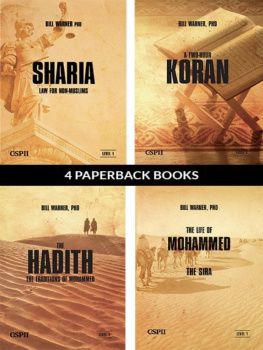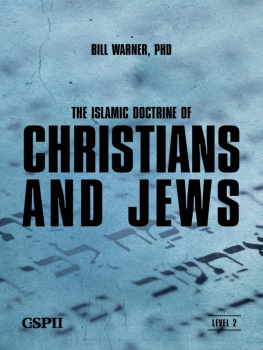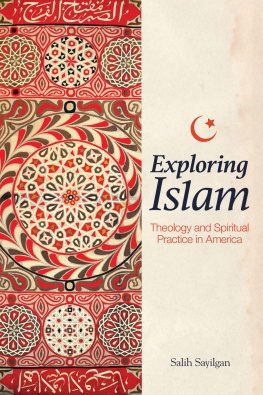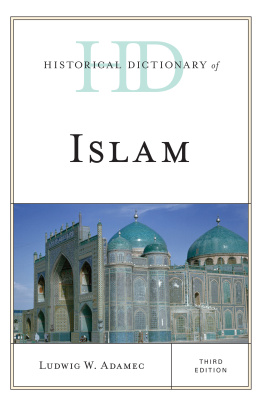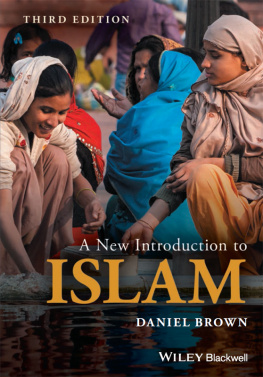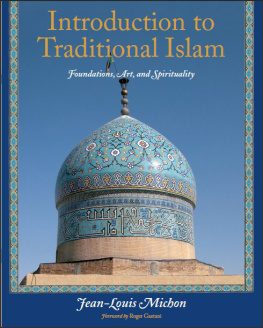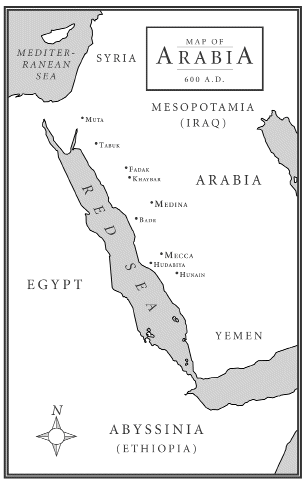OVERVIEW
CHAPTER 1
The easiest way to learn about Islam is to learn about Mohammed. His biography is called the Sira, and this book is a condensation of it.
THE ISLAMIC BIBLETHE TRILOGY
Islam is defined by the words of Allah in the Koran, and the words and actions of Mohammed, called the Sunna.
The Sunna is found in two collections of textsthe Sira (Mohammeds life) and the Hadith. The Koran says 91 times that his words and actions are considered to be the divine pattern for humanity.
A hadith, or tradition, is a brief story about what Mohammed did or said. A collection of hadiths is called a Hadith. There are many collections of hadiths, but the most authoritative are those by Bukhari and Abu Muslim, the ones used in this book.
So the Trilogy is the Koran, the Sira and the Hadith. Most people think that the Koran is the bible of Islam, but it is only about 14% of the total textual doctrine. The Trilogy is the foundation and totality of Islam.
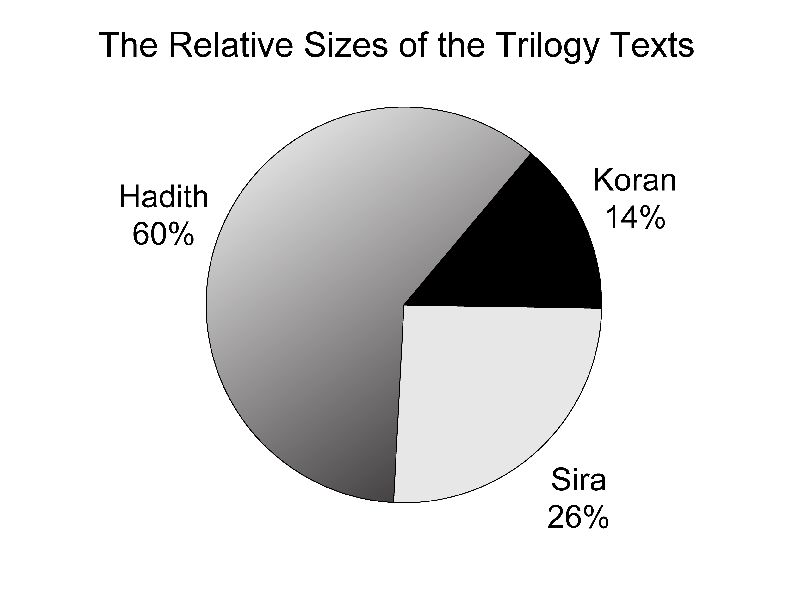
Islam is defined by the words of Allah in the Koran, and the words and actions of Mohammed, the Sunna.
No one text of the Trilogy can stand by itself; it is impossible to understand any one of the texts without the other supporting texts. The Koran, Sira, and Hadith are a seamless whole and speak with one voice. If it is in the Trilogy it is Islam.
KAFIR
The word Kafir will be used in this book instead of unbeliever, the standard usage. Unbeliever is a neutral term. The Koran defines the Kafir and Kafir is not a neutral word. A Kafir is not merely someone who does not agree with Islam, but a Kafir is evil, disgusting, the lowest form of life. Kafirs can be deceived, hated, enslaved, tortured, killed, lied to and cheated. So the usual word unbeliever does not reflect the political reality of Islam.
There are many religious names for Kafirs: polytheists, idolaters, People of the Book (Christians and Jews), Buddhists, atheists, agnostics, and pagans. Kafir covers them all, because no matter what the religious name is, they can all be treated the same. What Mohammed said and did to polytheists can be done to any other category of Kafir.
Islam devotes a great amount of energy to the Kafir. The majority (64%) of the Koran is devoted to the Kafir, and nearly all of the Sira (81%) deals with Mohammeds struggle with them. The Hadith (Traditions) devotes 32% of the text to Kafirs. Overall, the Trilogy devotes 60% of its content to the Kafir.
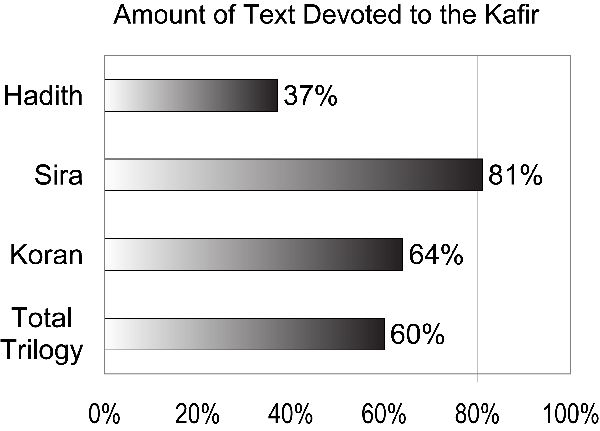
Here are a few of the Koran references:
A Kafir can be mocked
83:34 On that day the faithful will mock the Kafirs, while they sit on bridal couches and watch them. Should not the Kafirs be paid back for what they did?
A Kafir can be beheaded
47:4 When you encounter the Kafirs on the battlefield, cut off their heads until you have thoroughly defeated them and then take the prisoners and tie them up firmly.
A Kafir can be plotted against
86:15 They plot and scheme against you [Mohammed], and I plot and scheme against them. Therefore, deal calmly with the Kafirs and leave them alone for a while.
A Kafir can be terrorized
8:12 Then your Lord spoke to His angels and said, I will be with you. Give strength to the believers. I will send terror into the Kafirs hearts, cut off their heads and even the tips of their fingers!
A Muslim is not the friend of a Kafir
3:28 Believers should not take Kafirs as friends in preference to other believers. Those who do this will have none of Allahs protection and will only have themselves as guards. Allah warns you to fear Him for all will return to Him.
A Kafir is cursed
33:60 They [Kafirs] will be cursed, and wherever they are found, they will be seized and murdered. It was Allahs same practice with those who came before them, and you will find no change in Allahs ways.
KAFIRS AND PEOPLE OF THE BOOK
Muslims tell Christians and Jews that they are special. They are People of the Book and are brothers in the Abrahamic faith. But in Islam you are a Christian, if and only if, you believe that Christ was a man who was a prophet of Allah; there is no Trinity; Jesus was not crucified nor resurrected and that He will return to establish Sharia law. To be a true Jew you must believe that the Torah is corrupt and Mohammed is the last in the line of Jewish prophets.
This verse is positive:
5:77 Say: Oh, People of the Book, do not step out of the bounds of truth in your religion, and do not follow the desires of those who have gone wrong and led many astray. They have themselves gone astray from the even way.
Islamic doctrine is dualistic, so there is an opposite view as well. Here is the last verse written about the People of the Book (A later verse abrogates or replaces an earlier verse. See page 26.). This is the final word. It calls for Muslims to make war on the People of the Book who do not believe in the religion of truth, Islam.
9:29 Make war on those who have received the Scriptures [Jews and Christians] but do not believe in Allah or in the Last Day. They do not forbid what Allah and His Messenger have forbidden. The Christians and Jews do not follow the religion of truth until they submit and pay the poll tax [jizya] and they are humiliated.
The sentence They do not forbid means that they do not accept Sharia law; until they submit means to submit to Sharia law. Christians and Jews who do not accept Mohammed as the final prophet are Kafirs.
In Islam, Christians and Jews are infidels and People of the Book; Hindus are polytheists and pagans. The terms infidel, People of the Book, pagan and polytheist are religious words. Only the word Kafir shows the common political treatment of the Christian, Jew, Hindu, Buddhist, animist, atheist and humanist. What is done to a pagan can be done to a Jew or any other Kafir.
It is simple. If you dont believe that Mohammed is the prophet of Allah, then you are a Kafir.
The word Kafir will be used in this book instead of unbeliever, non-Muslim or disbeliever. Unbeliever or non-Muslim are neutral terms, but Kafir is not a neutral word. It is extremely bigoted and biased.
THE THREE VIEWS OF ISLAM
There are three points of view in dealing with Islam. The point of view you have depends upon how you feel about Mohammed. If you believe Mohammed is the prophet of Allah, then you are a believer. If you dont, you are a Kafir. The third viewpoint is that of a dhimmi , a Kafir who is an apologist for Islam.
Dhimmis do not believe that Mohammed was a prophet, but they never say anything that would displease a Muslim. Dhimmis never offend Islam and condemn any analysis that is critical of Islam as being biased.
Let us give an example of the three points of view.
In Medina, Mohammed sat all day long beside his 12-year-old wife while they watched as the heads of 800 Jews were removed by sword. Their heads were cut off because they had said that Mohammed was not the prophet of Allah. Muslims view these deaths as necessary because denying Mohammeds prophet-hood was an offense against Islam, and beheading is the accepted method of punishment, sanctioned by Allah.

